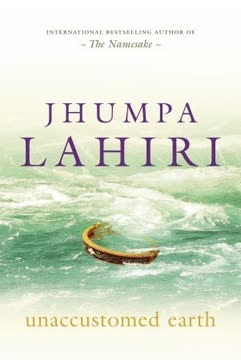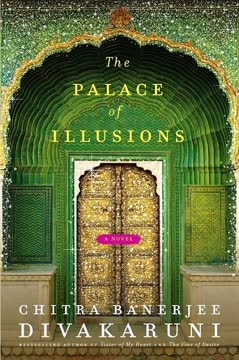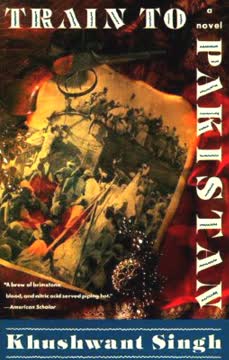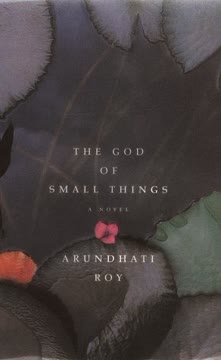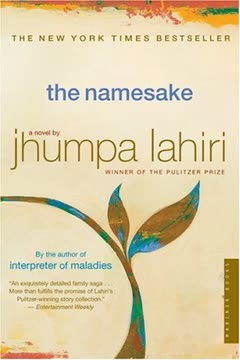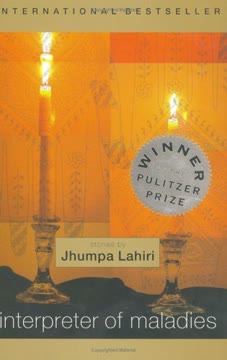Plot Summary
Unaccustomed Earth Blooms
After Ruma's mother dies, her father retires and begins traveling the world, sending impersonal postcards to Ruma, who has moved to Seattle with her husband Adam and their son Akash. Ruma, pregnant again, is isolated and uncertain whether to invite her widowed father to live with them, torn between cultural expectations and her own needs. When her father visits, he quietly transforms her garden and bonds with Akash, revealing a new side of himself. Ruma struggles with guilt and the fear of losing her independence, while her father, secretly in a relationship with another woman, Mrs. Bagchi, finds new happiness. Their week together is filled with unspoken tensions, small revelations, and the realization that love and connection can take unexpected forms. The story ends with Ruma discovering her father's unsent postcard to Mrs. Bagchi, understanding at last the private life he's chosen, and letting go of her expectations.
Hell-Heaven's Quiet Fires
Usha, the narrator, recalls her mother's deep, unrequited love for Pranab Kaku, a fellow Bengali immigrant who becomes a fixture in their family's life in 1970s Cambridge. Pranab Kaku's presence brings joy and excitement to Usha's mother, who is otherwise lonely and disconnected from her husband and American life. When Pranab Kaku falls in love with Deborah, an American woman, Usha's mother is devastated, her heartbreak masked by cultural propriety. The story traces the evolution of these relationships over decades, as Pranab Kaku and Deborah marry, have children, and eventually divorce. Usha's mother's pain is revealed in a near-tragic moment, but she survives, and over time, finds a new, quieter companionship with her husband. The narrative explores the complexities of love, jealousy, assimilation, and the silent sacrifices of immigrant women.
Marriages and Mismatches
Amit and Megan, married with two daughters, attend the wedding of Amit's old school friend Pam at his elite boarding school. The trip, meant to be a romantic getaway, exposes the strains in their marriage: Megan's exhaustion, Amit's nostalgia and insecurity, and their mutual longing for lost intimacy. The wedding is a catalyst for reflection on their own choices, backgrounds, and the subtle ways love and partnership change over time. Amit's confession to a stranger about the "disappearance" of his marriage shocks Megan, but ultimately, a moment of reconnection in a dorm room rekindles their bond. The chapter examines the pressures of parenthood, the search for belonging, and the bittersweet nature of growing older together.
Siblings and Shadows
Sudha, the responsible older sister, introduces her younger brother Rahul to alcohol, unwittingly setting him on a path of addiction and self-destruction. As Sudha excels academically and builds a life in London, Rahul flounders, dropping out of college, struggling with jobs, and alienating his family. Their parents, immigrants from India, are unable to confront Rahul's problems, clinging to denial and cultural pride. Sudha's attempts to help are met with resentment, and a final betrayal—Rahul's drunken neglect of Sudha's child—forces her to sever ties. Years later, Rahul reaches out, sober and changed, but the damage lingers. The story is a meditation on family, responsibility, and the limits of love.
Nobody's Business But Ours
Sang, a single Bengali woman in Boston, is besieged by marriage proposals from strangers, while secretly entangled with Farouk, a charismatic but unfaithful boyfriend. Her housemate Paul, quietly in love with her, becomes an unwitting confidant to Deirdre, Farouk's other lover. As secrets unravel, Sang's world collapses—her relationship ends, she leaves her job and home, and Paul is left with the residue of their shared but unspoken longing. The chapter explores the loneliness of modern life, the messiness of desire, and the ways in which our private heartbreaks intersect with others'.
Departures and Returns
The stories in this chapter focus on the recurring theme of families leaving and returning—between India and America, childhood and adulthood, connection and estrangement. Whether it's parents returning to India after years in the U.S., or children forging new paths abroad, each departure is tinged with both hope and loss. The characters grapple with the meaning of home, the pull of roots, and the inevitability of change.
Once in a Lifetime
Hema and Kaushik, children of Bengali immigrants, are thrown together when Kaushik's family returns from India and stays with Hema's family. Hema, a young girl, develops a crush on the older, aloof Kaushik, who is struggling with the knowledge of his mother's terminal illness. Their brief, awkward intimacy is marked by misunderstandings and the unspoken weight of mortality. The story captures the fleeting nature of childhood connections and the ways in which early experiences of loss shape us.
Year's End, New Beginnings
Years later, Kaushik's mother has died, and his father remarries a much younger woman, Chitra, who brings her two daughters into the family. Kaushik, now a college student, returns home for the holidays, resentful and alienated. He bonds with his new stepsisters but ultimately lashes out, unable to accept the new family structure or the erasure of his mother's memory. His flight up the Maine coast, burying his mother's photographs, is both an act of mourning and a refusal to move on. The chapter explores grief, memory, and the difficulty of embracing new beginnings.
Going Ashore, Going Under
As adults, Hema and Kaushik meet again by chance in Rome, both at turning points in their lives. Hema is about to enter an arranged marriage; Kaushik is a photojournalist about to move to Hong Kong. Their brief, passionate affair is shadowed by the knowledge that it cannot last. Kaushik asks Hema to choose him, but she cannot give up her life for him. They part, and Kaushik travels to Thailand, where he is killed in the 2004 tsunami. Hema, pregnant and married, mourns him from afar. The story is a meditation on destiny, the choices we make, and the love that might have been.
Generations in Translation
Across the stories, characters struggle to balance the traditions of their Bengali heritage with the realities of American life. Language, food, marriage, and parenting become battlegrounds for identity. The older generation clings to customs, while the younger generation adapts, assimilates, and sometimes rebels. The result is both enrichment and loss—a sense of being at home in two worlds, but never fully belonging to either.
Love's Unspoken Languages
Whether between parents and children, lovers, or siblings, much of the emotional life in these stories is unspoken. Characters yearn for connection but are often unable to articulate their needs, desires, or grief. Letters are left unsent, feelings are buried, and crucial truths are discovered too late. The silence is both a source of pain and a form of protection.
The Weight of Absence
Death, divorce, and estrangement haunt the characters, leaving them to navigate the world with a sense of incompleteness. The absence of loved ones—whether through death, distance, or emotional withdrawal—shapes their choices and their sense of self. Yet, in the spaces left behind, new growth is possible.
The Inheritance of Silence
The stories trace the inheritance of not just material possessions, but also silence, secrets, and emotional legacies. Children inherit their parents' unresolved conflicts, their unspoken dreams, and their capacity for both love and disappointment. The struggle to break these cycles—or to accept them—defines many of the characters' journeys.
The Cost of Belonging
The desire to belong—to family, to community, to a country—comes at a price. Characters sacrifice parts of themselves, or are forced to choose between competing loyalties. The cost is sometimes paid in loneliness, sometimes in the loss of cultural identity, and sometimes in the quiet acceptance of a life that is "good enough."
The Geography of Loss
Homes, gardens, cities, and even continents become charged with meaning, holding the memories of those who have left or died. Moving, selling a house, or returning to a homeland is never just a practical matter—it is an emotional reckoning with the past and a negotiation with the future.
The Ties That Fray
Whether through addiction, betrayal, or simple drift, the ties that bind families are tested again and again. Some are repaired, some are severed, and some are simply endured. The stories refuse easy resolutions, acknowledging the complexity and resilience of familial love.
The Unsent Postcard
The motif of the unsent letter or postcard recurs, symbolizing the things left unsaid between loved ones. When Ruma discovers her father's postcard to Mrs. Bagchi, she is forced to confront the reality of his inner life and to accept that love and happiness can take forms she never imagined.
The Endings We Choose
The collection ends with characters making choices—some bold, some reluctant, some simply necessary. Whether it is Hema's decision to marry Navin, Kaushik's solitary journey, or Ruma's act of mailing her father's postcard, each ending is both a loss and a beginning, a step into unaccustomed earth.
Characters
Ruma
Ruma is a second-generation Bengali American, a lawyer turned stay-at-home mother, struggling with the expectations of her heritage and her own desires. After her mother's death, she is adrift—isolated in a new city, uncertain about her role as a daughter, wife, and mother. Her relationship with her father is marked by distance and misunderstanding, but also by a deep, if unspoken, love. Ruma's journey is one of gradual acceptance—of her father's independence, of her own limitations, and of the possibility of happiness in unexpected forms.
Ruma's Father
A retired pharmaceutical executive, Ruma's father is a man who has spent his life fulfilling duties and suppressing his own desires. After his wife's death, he discovers a new freedom in travel and companionship with Mrs. Bagchi. He is practical, reserved, and quietly loving, especially toward his grandson Akash. His refusal to move in with Ruma is both an assertion of autonomy and a gift to his daughter, allowing her to build her own life. His secret relationship is a late-life assertion of selfhood, challenging the expectations of both family and culture.
Akash
Ruma's young son, Akash, is a symbol of continuity and change. He is the link between past and future, absorbing the love of his mother and grandfather, and embodying the hybrid identity of his family. His innocence and curiosity draw out tenderness in the adults around him, and his small acts—like burying his grandfather's postcard—become catalysts for revelation and growth.
Usha
In "Hell-Heaven," Usha is the daughter of Bengali immigrants, a keen observer of her mother's emotional life and the shifting dynamics of their family. She is both participant and witness, absorbing the lessons of love, jealousy, and cultural adaptation. As she grows, she reconciles with her mother and comes to understand the complexities of the adult world.
Pranab Kaku
Pranab Kaku is a fellow Bengali immigrant who becomes a surrogate family member, bringing joy and disruption to Usha's household. His relationships—with Usha's mother, with Deborah, and with his own family—embody the tensions of assimilation, desire, and the search for belonging. His eventual betrayal and divorce reveal the fragility of happiness and the enduring consequences of choices.
Sudha
In "Only Goodness," Sudha is the high-achieving older sibling who tries to guide and protect her brother Rahul, only to become complicit in his downfall. Her sense of duty is both her strength and her burden, leading to guilt, resentment, and ultimately, the painful decision to cut ties. Her journey is one of self-forgiveness and the recognition of limits.
Rahul
Rahul is Sudha's younger brother, whose charm and intelligence are undermined by addiction and self-sabotage. He is both victim and agent of his own decline, unable to meet the expectations of his family or to find peace within himself. His eventual recovery is tentative and incomplete, a reminder of the enduring scars of family dysfunction.
Sang
Sang is a thirty-something Bengali American, outwardly independent but inwardly vulnerable. Her entanglement with Farouk, and the web of secrets and betrayals that ensue, expose the loneliness and longing beneath her self-sufficiency. Her story is a portrait of contemporary urban life, where intimacy is elusive and the search for connection is fraught with risk.
Paul
Paul is Sang's housemate, a graduate student whose unspoken love for her is both a source of hope and pain. His role as confidant and bystander in Sang's romantic drama highlights the ways in which we are shaped by the lives of others, even when we remain on the margins. His eventual act of intervention is both selfless and self-defeating, a testament to the complexity of love and friendship.
Hema and Kaushik
Hema and Kaushik are the central figures in the trilogy that closes the collection. Their childhood encounter, marked by loss and misunderstanding, sets the stage for their adult reunion in Rome. Both are shaped by the immigrant experience, by the deaths of parents, and by the longing for a home they can never fully claim. Their brief affair is a collision of past and present, possibility and regret. Kaushik's death in the tsunami is a devastating coda, leaving Hema to carry the memory—and the consequences—of their love.
Plot Devices
Interconnected Short Stories
Lahiri's collection is structured as a series of stories that stand alone but are united by recurring motifs: immigration, generational conflict, loss, and the search for belonging. The final three stories form a trilogy, following Hema and Kaushik from childhood to adulthood, providing a narrative arc that echoes and deepens the themes of the earlier stories.
Dual Perspectives and Shifting Narrators
Many stories employ dual or shifting perspectives, allowing readers to see events from different angles and to appreciate the misunderstandings and silences that shape relationships. This device underscores the difficulty of true communication and the multiplicity of experience within families.
Symbolic Objects and Letters
Objects—postcards, photographs, jewelry, gardens—serve as repositories of memory and meaning. Letters and unsent messages symbolize the things left unspoken, the emotional distance between characters, and the possibility of reconciliation or revelation.
Foreshadowing and Circularity
Events and images recur across the collection, creating a sense of circularity and inevitability. The past is never fully past; childhood experiences reverberate into adulthood, and the choices of one generation shape the lives of the next. Foreshadowing is used subtly, often through small details or offhand remarks that gain significance in retrospect.
Cultural Hybridity and Displacement
The stories are set in a variety of locations—America, India, Europe—and characters are constantly negotiating the boundaries between cultures. This sense of displacement is both a source of anxiety and a wellspring of creativity, forcing characters to invent new ways of being and loving.
Analysis
Jhumpa Lahiri's Unaccustomed Earth is a masterful exploration of the immigrant experience, the complexities of family, and the quiet devastations of love and loss. Through a series of interconnected short stories, Lahiri examines how the children of immigrants inherit not just traditions and expectations, but also silence, longing, and the burden of unfinished lives. Her characters are caught between worlds—geographically, culturally, emotionally—struggling to forge identities and relationships in the unaccustomed earth of their adopted homes. The collection is marked by exquisite psychological insight, a deep empathy for human frailty, and a refusal to offer easy answers. Lahiri's prose is spare but luminous, capturing the nuances of everyday life and the seismic shifts that occur beneath the surface. The stories remind us that belonging is always provisional, that love is often imperfect, and that the most profound connections are sometimes those that are never fully realized. In the end, Unaccustomed Earth is a meditation on the necessity—and the cost—of adaptation, and on the enduring human need to put down roots, even in unfamiliar soil.
Last updated:
FAQ
Synopsis & Basic Details
What is Unaccustomed Earth about?
- Intergenerational Immigrant Narratives: Unaccustomed Earth by Jhumpa Lahiri is a collection of short stories exploring the lives of Bengali immigrants and their American-born children, navigating themes of cultural assimilation, family duty, love, loss, and the search for identity across continents. The book is divided into two parts, with the latter half forming a poignant trilogy about Hema and Kaushik.
- Emotional Landscapes of Displacement: The stories delve into the emotional complexities of characters caught between traditional Indian values and modern American life, often highlighting the unspoken desires, sacrifices, and misunderstandings that shape their relationships. It examines how individuals adapt to new environments, both physical and emotional, and the lasting impact of their heritage.
- Subtle Human Connections: Lahiri masterfully portrays the quiet dramas of everyday life, focusing on the subtle shifts in family dynamics, the weight of unspoken words, and the profound ways in which people connect or disconnect. The narratives are rich with psychological depth, revealing the inner lives of characters grappling with grief, ambition, and the elusive nature of happiness.
Why should I read Unaccustomed Earth?
- Deep Emotional Resonance: Readers should engage with Unaccustomed Earth for its profound emotional depth and Lahiri's unparalleled ability to articulate the nuances of human relationships, especially within immigrant families. The stories offer a window into the universal struggles of identity, belonging, and the silent burdens carried across generations.
- Masterful Prose and Character Development: Lahiri's writing style is celebrated for its precision, elegance, and keen psychological insight, making even the most mundane details resonate with meaning. The characters are richly drawn, complex individuals whose internal conflicts and quiet transformations are deeply relatable, offering a compelling exploration of the human condition.
- Cultural and Universal Themes: The collection provides a rich exploration of cultural hybridity and displacement, the challenges of assimilation, and the enduring power of family ties, making it relevant to anyone interested in the immigrant experience or the universal search for connection and self-discovery. It offers fresh perspectives on love, loss, and the pursuit of happiness in a changing world.
What is the background of Unaccustomed Earth?
- Post-Colonial Immigrant Experience: The stories are set against the backdrop of the post-1960s immigration wave from India to the United States, particularly focusing on Bengalis. This historical context highlights the challenges faced by the first generation in adapting to a new country and the subsequent cultural negotiation for their American-born children.
- Cultural Hybridity in America: Lahiri explores the specific cultural context of Bengali-American identity, showcasing the blend of traditions, languages, and expectations. This includes arranged marriages, the importance of community, traditional food, and the pressure to succeed academically and professionally, all juxtaposed with American individualism and freedom.
- Geographical and Emotional Displacement: The settings span various locations from suburban Massachusetts and Seattle to London, Rome, and even war-torn El Salvador and Thailand. These diverse geographies underscore the characters' sense of displacement and their constant search for a place to truly belong, reflecting the "unaccustomed earth" of the title.
What are the most memorable quotes in Unaccustomed Earth?
- "Human nature will not flourish, any more than a potato, if it be planted and replanted, for too long a series of generations, in the same worn-out soil. My children have had other birthplaces, and, so far as their fortunes may be within my control, shall strike their roots into unaccustomed earth.": This epigraph from Nathaniel Hawthorne's "The Custom-House" perfectly encapsulates the central theme of the collection: the necessity and challenge of seeking new ground for growth, both literally and metaphorically, for immigrant families and their descendants. It highlights the tension between tradition and the need for new experiences.
- "It was like being dead, my escape allowing me to taste that tremendous power my mother possessed forever.": From "Year's End," Kaushik's reflection on his solitary journey up the Maine coast reveals his profound grief and his complex relationship with his deceased mother. This quote captures the paradoxical sense of liberation and connection to his mother's ultimate absence, suggesting that death grants a final, unassailable freedom from earthly ties and expectations.
- "You're a coward.": Uttered by Kaushik to Hema in "Going Ashore," this stark accusation cuts to the core of Hema's decision to pursue a safe, arranged marriage over a passionate, uncertain future with him. It's memorable for its brutal honesty, encapsulating the difficult choices characters face between societal expectations and personal desires, and the painful judgments that can arise from such decisions.
What writing style, narrative choices, and literary techniques does Jhumpa Lahiri use?
- Luminous, Restrained Prose: Lahiri employs a precise, elegant, and often understated prose style, characterized by clear, direct sentences that convey deep emotional complexity without overt sentimentality. Her language is accessible yet rich in subtle detail, allowing readers to infer much from what is left unsaid.
- Intimate Third-Person and First-Person Perspectives: The collection frequently shifts between close third-person narration and deeply personal first-person accounts, offering intimate access to the characters' inner lives and subjective experiences. This narrative choice enhances the exploration of individual identity and the often-solitary nature of their struggles.
- Symbolism and Recurring Motifs: Lahiri masterfully uses recurring symbols like food, clothing, photographs, and geographical locations to underscore thematic concerns such as cultural identity, memory, and displacement. The "unsent postcard" motif, for instance, powerfully represents unspoken truths and missed connections, adding layers of meaning to the characters' emotional landscapes.
Hidden Details & Subtle Connections
What are some minor details that add significant meaning?
- Ruma's Father's Ashtray: In "Unaccustomed Earth," Ruma's father's brass ashtray, shaped like a "nagrai slipper," which Ruma appropriated as a child to play Cinderella, subtly foreshadows his later, hidden romantic life. The ashtray, a relic of his past smoking habit (acquired in India), becomes a toy for Ruma, symbolizing her innocent appropriation of his cultural past, while his new relationship with Mrs. Bagchi is a secret, adult re-engagement with personal desire, much like the hidden "slipper" of his affection.
- The "Mole" Paint Color: In "Nobody's Business," Sang's choice of "mole" for her room's trim, a color she finds doesn't resemble a mole at all, is a subtle hint at her own hidden life and the deceptive appearances she maintains. Moles are subterranean creatures, and the color choice, coupled with Paul's later discovery of Farouk's infidelity, underscores the hidden, often dark, truths lurking beneath the surface of Sang's seemingly composed existence.
- Kaushik's Mother's Missing Suitcase: In "Once in a Lifetime," the detail of Kaushik's mother's suitcase being misdirected to Johannesburg after their return from India, rather than Rome, subtly symbolizes her deeper displacement and the unraveling of her life due to cancer. The lost luggage represents not just material possessions but a loss of control and direction, mirroring her terminal illness and the family's forced relocation, highlighting the theme of the geography of loss.
What are some subtle foreshadowing and callbacks?
- The "Hell-Heaven" Metaphor: In "Hell-Heaven," Usha's mother's backward metaphor, "It's just hell–heaven, the difference," when describing Pranab Kaku's change after meeting Deborah, subtly foreshadows the eventual "hell" of his divorce and the "heaven" of her own parents' quiet reconciliation. This linguistic inversion hints at the complex, often ironic, turns of fate and emotional journeys within the story.
- Amit's Gray Hair Origin: In "A Choice of Accommodations," Amit's gray hair, which began at Langford after his parents sent him away, is initially attributed to trauma, but he dismisses it. This detail subtly foreshadows his later realization that his parents' decision to send him away, and his subsequent emotional distance from them, was a profound, if unacknowledged, trauma that shaped his identity and relationships.
- The Etruscan Sarcophagus: In "Going Ashore," Hema's tearful reaction to the Etruscan sarcophagus of a bride and groom, feeling "something dead about the marriage she was about to enter into," foreshadows the tragic end of her brief affair with Kaushik and the unfulfilled potential of their connection. The ancient tomb becomes a symbolic mirror for her own impending, emotionally compromised union with Navin, highlighting themes of fate and missed opportunities.
What are some unexpected character connections?
- Paul's Shared Vulnerability with Sang: In "Nobody's Business," Paul's quiet, unrequited love for Sang is unexpectedly deepened by his shared experience of emotional vulnerability. His own past heartbreak with Theresa, where he felt "strangely efficient and agreeable" in the wake of shame, mirrors Sang's later stoicism and self-inflicted pain after discovering Farouk's betrayal, creating a profound, unspoken empathy between them.
- Kaushik's Father's Poetic Side: In "Year's End," Kaushik's discovery that his civil engineer father was also a poet, a "family secret," reveals an unexpected layer to his reserved parent. This detail connects to Kaushik's own artistic pursuit as a photojournalist, suggesting a hidden, inherited sensitivity and a shared, though unacknowledged, artistic temperament that transcends their outwardly practical personas.
- Ruma's Father's Hidden Attentiveness: In "Unaccustomed Earth," Ruma's father's meticulous care for Akash, from bathing him to reading him Green Eggs and Ham, reveals an unexpected tenderness and engagement that Ruma never experienced from him in her own childhood. This connection highlights his capacity for love and presence, contrasting sharply with his earlier emotional distance from his own children and his wife.
Who are the most significant supporting characters?
- Mrs. Bagchi (Unaccustomed Earth): Mrs. Bagchi is crucial as Ruma's father's secret companion, symbolizing his late-life pursuit of personal happiness and autonomy after decades of duty. Her independence and refusal to remarry challenge traditional expectations, providing Ruma's father with a relationship free from the burdens of his past marriage and family obligations.
- Deborah (Hell-Heaven): Deborah, Pranab Kaku's American wife, acts as a catalyst for Usha's mother's profound jealousy and eventual emotional growth. Her presence forces the Bengali community to confront assimilation and mixed marriages, while her later vulnerability after Pranab Kaku's infidelity allows Usha's mother to find a new sense of self and empathy.
- Paul (Nobody's Business): Paul, Sang's housemate, serves as the moral compass and unwitting confidant in Sang's tumultuous relationship with Farouk. His quiet observation and eventual intervention, revealing Farouk's infidelity, highlight themes of unspoken love, loyalty, and the painful truths that can shatter illusions, making him a pivotal figure in Sang's awakening.
Psychological, Emotional, & Relational Analysis
What are some unspoken motivations of the characters?
- Ruma's Father's Pursuit of Solitude and Self-Discovery: In "Unaccustomed Earth," Ruma's father's extensive travels and secret relationship with Mrs. Bagchi are driven by an unspoken desire for personal freedom and self-discovery, long suppressed during his marriage. He explicitly states, "this was his life now, the ability to do as he pleased, the responsibility of his family absent," revealing a deep-seated need to escape the "mess, the feuds, the demands, the energy" of family life.
- Usha's Mother's Yearning for Romantic Love: In "Hell-Heaven," Usha's mother's intense, unrequited love for Pranab Kaku stems from an unspoken longing for romantic passion and intellectual companionship that was absent in her arranged marriage. Her meticulous preparations for his visits and her devastation when he marries Deborah reveal a profound emotional void that Pranab Kaku temporarily filled, highlighting the sacrifices of immigrant women.
- Kaushik's Avoidance of Domesticity and Attachment: In "Going Ashore," Kaushik's career as a photojournalist, constantly moving between war zones, is motivated by an unspoken need to avoid domesticity and deep personal attachments, a coping mechanism for the trauma of his mother's illness and death. His reluctance to settle down or commit to Hema reflects a fear of vulnerability and the pain associated with loss, preferring the transient nature of his work.
What psychological complexities do the characters exhibit?
- Ruma's Guilt and Identity Crisis: Ruma in "Unaccustomed Earth" grapples with profound guilt over her mother's death and her own evolving identity as a mother and wife. Her internal conflict between traditional Bengali expectations (caring for her father) and her American-influenced desire for independence creates a psychological tension, manifesting in her isolation and inability to find happiness despite her seemingly perfect life.
- Sudha's Burden of Responsibility and Self-Blame: In "Only Goodness," Sudha exhibits a complex psychology rooted in her role as the "responsible" older sister. Her initial introduction of Rahul to alcohol, followed by his addiction, burdens her with immense guilt and a relentless need to "fix" him, even as she resents her parents' denial. This leads to a cycle of enabling and emotional exhaustion, highlighting the psychological toll of familial responsibility.
- Kaushik's Emotional Detachment and Trauma: Kaushik, particularly in "Year's End" and "Going Ashore," displays a deep-seated emotional detachment stemming from his mother's prolonged illness and death. His inability to grieve openly, his lashing out at his stepsisters, and his transient lifestyle as a photojournalist are all manifestations of unresolved trauma, creating a complex character who struggles with intimacy and belonging.
What are the major emotional turning points?
- Ruma's Postcard Revelation: In "Unaccustomed Earth," the discovery of her father's unsent postcard to Mrs. Bagchi is a major emotional turning point for Ruma. It shatters her preconceived notions of her father's grief and loneliness, forcing her to confront his hidden happiness and her own self-centered expectations, leading to a moment of acceptance and a shift in her understanding of love and autonomy.
- Usha's Mother's Near Self-Immolation: The most dramatic emotional turning point in "Hell-Heaven" is Usha's mother's attempt to douse herself with lighter fluid after Pranab Kaku's wedding. This desperate act, born of suppressed grief and unrequited love, reveals the depth of her emotional suffering and the silent sacrifices she made, marking a pivotal moment in Usha's understanding of her mother's inner life.
- Sudha's Decision to Sever Ties with Rahul: In "Only Goodness," Sudha's decision to send Rahul away after he drunkenly neglects her baby, Neel, is a painful but crucial emotional turning point. It signifies her breaking free from the cycle of enabling and her acceptance of the limits of her ability to "fix" her brother, prioritizing her own family's safety and well-being over her long-held sense of familial duty.
How do relationship dynamics evolve?
- Parent-Child Roles Reversal: In "Unaccustomed Earth," the dynamic between Ruma and her father evolves from Ruma feeling responsible for her widowed father to her realizing his newfound independence. Initially, Ruma feels burdened by cultural expectations to care for him, but his secret relationship and self-sufficiency reverse this, allowing her to see him as an individual with his own desires, rather than solely as a dependent parent.
- Marital Bonds Forged Through Shared Adversity: In "Hell-Heaven," Usha's parents' arranged marriage, initially marked by distance and her mother's unrequited love for Pranab Kaku, evolves into a quiet, affectionate companionship in their old age. The shared experience of Pranab Kaku's betrayal and their daughter's departure for college fosters a new solidarity and warmth, demonstrating how enduring relationships can be forged through habit and mutual support.
- Sibling Relationships Defined by Trauma and Distance: The relationship between Sudha and Rahul in "Only Goodness" transforms from a protective older sister/dependent younger brother dynamic to one of painful estrangement. Sudha's initial enabling gives way to resentment and, ultimately, a forced separation due to Rahul's addiction. Their eventual, tentative reconnection is marked by the lingering scars of past trauma and the recognition that their bond can only exist with new boundaries.
Interpretation & Debate
Which parts of the story remain ambiguous or open-ended?
- The Full Extent of Ruma's Father's Past Happiness: In "Unaccustomed Earth," while Ruma discovers her father's new relationship, the narrative leaves ambiguous the true nature and depth of his happiness with Mrs. Bagchi, and how long this relationship had been developing. This ambiguity highlights the private lives parents lead, often unknown to their children, and the subjective nature of contentment.
- The Future of Sudha and Rahul's Relationship: In "Only Goodness," Rahul's letter of apology and his visit to London offer a fragile hope for reconciliation, but the story ends with Sudha's cautious acceptance and the lingering fear of his relapse. The long-term stability of Rahul's recovery and the true healing of their sibling bond remain open-ended, reflecting the ongoing challenges of addiction and family forgiveness.
- The Nature of Hema and Kaushik's Connection: In "Going Ashore," the intense, brief affair between Hema and Kaushik is presented as a "once in a lifetime" connection, yet Hema ultimately chooses her arranged marriage. The story leaves open whether her choice was truly a "cowardice" or a pragmatic decision, and whether their love, had it been pursued, could have overcome their deep-seated individual issues and the practicalities of their lives.
What are some debatable, controversial scenes or moments in Unaccustomed Earth?
- Kaushik's Outburst at His Stepsisters: In "Year's End," Kaushik's cruel verbal attack on his young stepsisters, Rupa and Piu, calling their mother a "servant" and denigrating them, is a highly controversial moment. While rooted in his grief and resentment over his mother's death and the perceived erasure of her memory, his actions are undeniably abusive, sparking debate about the limits of empathy for a grieving character and the impact of inherited trauma.
- Usha's Mother's Attempted Self-Immolation: In "Hell-Heaven," the scene where Usha's mother douses herself with lighter fluid, contemplating suicide due to her unrequited love and loneliness, is a shocking and debatable moment. It raises questions about the severity of her emotional suffering, the cultural pressures she faced, and the extent to which her actions were a desperate cry for help versus a genuine attempt to end her life, highlighting the hidden depths of immigrant women's despair.
- Hema's Choice of Arranged Marriage Over Kaushik: In "Going Ashore," Hema's decision to proceed with her arranged marriage to Navin despite her passionate affair with Kaushik, who explicitly asks her not to marry him, is a point of significant debate. Readers often question whether her choice is a betrayal of true love, a pragmatic surrender to societal expectations, or a self-protective act given Kaushik's transient nature and emotional unavailability.
Unaccustomed Earth Ending Explained: How It Ends & What It Means
- "Unaccustomed Earth" Ending Explained: Ruma's Acceptance of Her Father's New Life: The first story concludes with Ruma discovering her father's unsent postcard to Mrs. Bagchi, revealing his secret romantic relationship. This moment signifies Ruma's realization that her father has found happiness and autonomy outside of his role as her parent, and outside the traditional expectations of a grieving widower. Her act of affixing a stamp to the postcard, despite her initial shock and hurt, symbolizes her acceptance of his independent life and her own journey towards self-reliance, letting go of the burden of his care.
- "Going Ashore" Ending Explained: Kaushik's Tragic Death and Hema's Lingering Grief: The final story, and the collection's overarching narrative, ends with Kaushik's death in the 2004 tsunami in Thailand, shortly after Hema chooses her arranged marriage over a life with him. Hema, now pregnant and married to Navin, mourns Kaushik from afar, feeling his absence "as plainly and implacably as the cells that were gathering and shaping themselves in my body." This tragic ending underscores the themes of fate, missed opportunities, and the enduring impact of love and loss, suggesting that some connections, though brief, leave indelible marks.
- Themes in Unaccustomed Earth: The Inevitability of Change and Unaccustomed Paths: The collection's ending, particularly the Hema and Kaushik trilogy, emphasizes that life rarely follows expected paths. Characters are forced to adapt to "unaccustomed earth"—new homes, new relationships, new identities—often through painful choices and unforeseen circumstances. Kaushik's death, and Hema's subsequent pregnancy, highlight the cyclical nature of life, loss, and new beginnings, suggesting that even in tragedy, life persists and new forms of connection and belonging emerge, albeit with lingering shadows of the past.
Review Summary
Unaccustomed Earth is a highly praised collection of short stories exploring themes of cultural displacement, family relationships, and personal struggles. Lahiri's elegant prose and insightful character development are consistently highlighted. Many readers appreciate her ability to capture nuanced emotions and universal experiences within the context of Indian-American immigrant life. While some criticize the repetitive nature of themes and settings, most reviewers find the stories deeply moving and beautifully crafted. The final trio of interconnected stories, "Hema and Kaushik," receives particular acclaim for its emotional depth and narrative structure.
Similar Books
Download PDF
Download EPUB
.epub digital book format is ideal for reading ebooks on phones, tablets, and e-readers.
